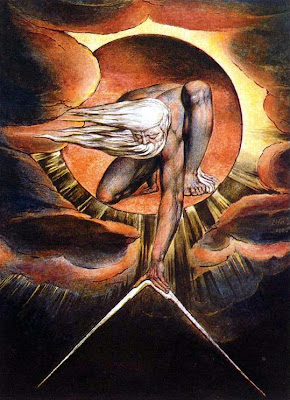
Thursday, January 31, 2008
The Amber Spyglass, Philip Pullman

William Blake, The Ancient of Days
(January 29) I loved Book I, was able to coast happily through Book II on that love, but found Book III a bit of a chore to get through. In trying to resolve all the giant questions and epic struggles set up in the first two books, The Amber Spyglass wanders all over the place and, I think, becomes completely incoherent at times.
Monday, January 07, 2008
The Subtle Knife, Philip Pullman
 (December 28) This is a respectable continuation of The Golden Compass story -- not a disappointing continuation, because Pullman's amazing imagination is so enjoyable, but not a dream-fulfilling continuation either, because now the story is getting a little overcomplicated, and Lyra and her world are no longer prominent (in fact, we are in our world, ho hum).
(December 28) This is a respectable continuation of The Golden Compass story -- not a disappointing continuation, because Pullman's amazing imagination is so enjoyable, but not a dream-fulfilling continuation either, because now the story is getting a little overcomplicated, and Lyra and her world are no longer prominent (in fact, we are in our world, ho hum).This book introduces a new character -- a 12-year-old boy, Will -- and I found myself really not wanting to be interested in him since it would be disloyal to Lyra, lol. But Pullman managed to overcome my bias and is successful with Will, I think -- his courage is just as thrilling as Lyra's, and he's his own person, not just a male Lyra. I really liked him, and was entirely captivated with the function and role of the knife.
I began to see here in Book II why Lyra is so appealing in Book I: she has a lot of balls, like a boy, but is still girlish and girly (e.g., in her affection for Pan and her bedazzlement by Mrs. Coulter). Will, in contrast, is tender and conscientious, very touchingly so, I thought, like a girl, and yet there was no doubt he is a boy. There are many satisfying little parallels in the two characters and in the ways the mystery looming around them draws them in, which make The Subtle Knife fun to read.
However, that über-story also starts to take itself very seriously, and wants to be an epic allegory now, rather than the localized little struggle it was in Book I. I find this less compelling. Also, it's hard to watch Lyra fade into a co-star role, sigh.
Michelangelo, David
Subscribe to:
Comments (Atom)